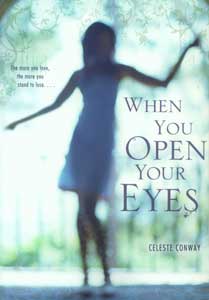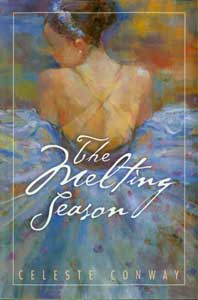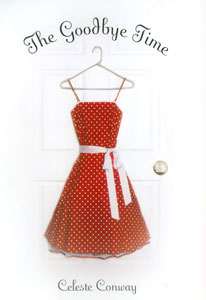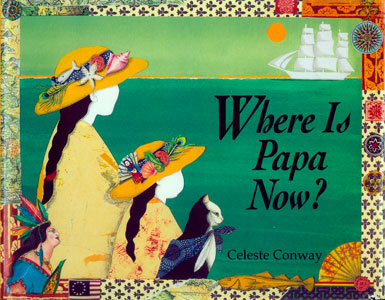REVIEWS & PRAISE
“For those who like their ballet books with a touch of mystery and horror, Unlovely is a very enjoyable book. The writing is outstanding! There are sentences and paragraphs that are so hauntingly evocative you will want to read them two or three times. The story takes place in a New England ocean village with a fancy ballet summer school on the outskirts. The problem is that if any male (dancer or towny) breaks a ballerina's heart, he ends up in a serious and sometimes fatal accident. Giselle is the ballet school’s summer performance and the storyline follows that plot. It is a fun, fascinating read. The story moves as gracefully, beautifully and tragically as the ballet itself. If you finish, and want more, it feels like the first book of a series. For ages 11 and up.”
Thick with evocative descriptions, Conway’s story is gripping and memorable."
"The plot twists are enough to keep readers of edgy, realistic fiction turning pages. The real strengths, however, are Conway’s ability to suggest motive and emotion in nuanced dialogue and the portrayal of Tessa’s growing gift for articulating the ironies of the complicated people in her world. As in all good literature, the epiphany is inevitably bittersweet. "
"Teen girls will recognize the urgency of first love and the ways in which it can take over one’s life. This is a solid addition to the darker side of the chick-lit genre."
"This dark romance’s dreamy atmosphere, dangerous undercurrents, artistic characters, and overarching theme of fidelity and trust will win over fans of Courtney Summers and Siobhan Vivian."
 “Conway (The Goodbye Time) pens an atmospheric novel set in Buenos Aires, where 16-year-old Tessa finds first love. Transplanted from suburban Virginia to Argentina by her controlling FBI agent father and self-absorbed mother, Tessa is immediately drawn to Lucien—the moody, artistic, and magnetic son of a French diplomat—even though her father forbids their relationship. Leaving her old life behind piece by piece, Tessa is drawn into a steamy clandestine romance with Lucien (“I want to fly away with him and never be left behind again”), as well as a life of partying with new friends who have the freedom she envies. But Lucien isolates Tessa as his behavior becomes increasingly unpredictable and violent; he pressures her into sex, leaves the country for weeks without calling, and plots a terrorist-inspired art project. Tessa’s meditative and intimate voice carries the story, as does the threat of Lucien’s instability. Thick with evocative descriptions of the subtle and not-so-subtle adaptations involved in living abroad, Conway’s story is gripping and memorable. Ages 14–up.”
“Conway (The Goodbye Time) pens an atmospheric novel set in Buenos Aires, where 16-year-old Tessa finds first love. Transplanted from suburban Virginia to Argentina by her controlling FBI agent father and self-absorbed mother, Tessa is immediately drawn to Lucien—the moody, artistic, and magnetic son of a French diplomat—even though her father forbids their relationship. Leaving her old life behind piece by piece, Tessa is drawn into a steamy clandestine romance with Lucien (“I want to fly away with him and never be left behind again”), as well as a life of partying with new friends who have the freedom she envies. But Lucien isolates Tessa as his behavior becomes increasingly unpredictable and violent; he pressures her into sex, leaves the country for weeks without calling, and plots a terrorist-inspired art project. Tessa’s meditative and intimate voice carries the story, as does the threat of Lucien’s instability. Thick with evocative descriptions of the subtle and not-so-subtle adaptations involved in living abroad, Conway’s story is gripping and memorable. Ages 14–up.”
“A modern day Romeo and Juliet. The novel's Romeo is Lucien, the manic, self-important son of a French diplomat, and Juliet is Tessa, the querulous daughter of an American FBI agent. The story takes place far from Verona, in Argentina . . . . Lucien’s penchant for dangerous behavior is well known in diplomatic circles and ostensibly the reason why Tessa’s father has forbidden her to see him. The two must meet in secret, and so begins the downward spiral of an astonishingly dysfunctional, co-dependent relationship. Lucien is a teen Svengali, lazing about in a silk kimono, working on “guerilla” art projects and threatening to consume Tessa with his neediness. . . Whether Lucien is a victim or a predator is up to readers to interpret . . . Steamy . . . rich and sensuous.
In Buenos Aires, Conway has situated the archetypal plot of the good girl attracted to the bad boy. Tessa, the daughter of an FBI agent working at the U.S. Embassy, is attracted to Lucien, the son of the French cultural attaché. Her forbidden relationship with him embroils her with a cosmopolitan group of teens into sex, drugs, art, and fashion, things about which Tessa suddenly feels unhappily inexperienced. Unlike Tessa, these teens are cut loose from the moorings of a supportive, if sometimes annoyingly protective, family. Added to this toxic recipe are Lucien’s potentially violent bouts with bipolar disorder, her father’s seamy colleague who appears to be stalking her on her father’s behalf, and eventual surprises about Tessa’s less-than-idyllic family.
The plot twists are enough to keep readers of edgy, realistic fiction turning pages. The real strengths, however, are Conway’s ability to suggest motive and emotion in nuanced dialogue and the portrayal of Tessa’s growing gift for articulating the ironies of the complicated people in her world. As in all good literature, the epiphany is inevitably bittersweet and not for those who need an unambiguously happy ending. It is not if you open your eyes, but when, and what you see is likely to be indelibly painful. The teens’ involvement with drugs and their sexual encounters make the book more appropriate for older readers.”
“Tessa’s life takes an exciting turn when her family moves from suburban Virginia to Buenos Aires where her father is an American FBI employee affiliated with the embassy. Her new circle of friends includes a group of worldly teenagers with access to many features of an adult lifestyle. Among them is her fellow-artist and new boyfriend, Lucien, the son of a French diplomat. Then Tessa’s father, who has recently returned from a two-year stint in Colombia, forbids her to see Lucien. Determined to maintain her relationship with the one person who makes her feel beautiful, talented, and needed, Tessa sneaks around. As her estrangement from her family grows, Lucien’s alluring behavior is becoming suspect and at times dangerous. When Tessa learns the latest trigger for his manic outbursts, she has a breakdown of her own. The story reaches a frenzied climax in which Tessa attempts to save Lucien from himself only to learn that she may be lucky to save her own life. The characters’ voices ring true and the plot moves along at an engaging pace. The subplots involving Tessa’s family add to the portrayal of the protagonist’s changing personality. Teen girls will recognize the urgency of first love and the ways in which it can take over one’s life. This is a solid addition to the darker side of the chick-lit genre.–School Library Journal.”
 Sixteen-year-old Giselle lives in a household where little has changed in the 10 years since the death of her father, a legendary dancer/choreographer. She attends a New York City school for students gifted in the arts, studies ballet under the watchful eye of her mother, an eminent former ballerina, and snatches what little free time she has to spend with her best friend, Magda. After meeting Will, though, everything begins to change. Smart, ironic, constrained and vulnerable, Giselle tells of the spring when her life suddenly shifts, allowing her to see the past differently and move forward in the direction of her choosing. . . this novel will capture readers with its vivid imagery, emotional subtlety, and fine dialogue. Often droll, the writing features apt turns of phrase and laugh-out-loud moments, as well as a convincing back-story and subtle portrayals of interactions between characters. Readers may find themselves rereading this first novel for the sheer pleasure of spending more time with these idiosyncratic characters. ”
Sixteen-year-old Giselle lives in a household where little has changed in the 10 years since the death of her father, a legendary dancer/choreographer. She attends a New York City school for students gifted in the arts, studies ballet under the watchful eye of her mother, an eminent former ballerina, and snatches what little free time she has to spend with her best friend, Magda. After meeting Will, though, everything begins to change. Smart, ironic, constrained and vulnerable, Giselle tells of the spring when her life suddenly shifts, allowing her to see the past differently and move forward in the direction of her choosing. . . this novel will capture readers with its vivid imagery, emotional subtlety, and fine dialogue. Often droll, the writing features apt turns of phrase and laugh-out-loud moments, as well as a convincing back-story and subtle portrayals of interactions between characters. Readers may find themselves rereading this first novel for the sheer pleasure of spending more time with these idiosyncratic characters. ”
“The book itself is thoroughly romantic, creating a vivid milieu of lush artistic eccentricity and faded grandeur for Giselle’s current and past home life that’s just the sort of existence one imagines young ballerinas leading. Conway effectively operates on two planes, the manifest reality of Giselle’s voice with its contemporary snarkiness and legitimate teen frustration . . . and a corps de ballet of metaphorical explorations of Giselle’s tentative moves toward maturation.”
“Frozen by her childhood memories of a father who died of cancer when she was 6, Giselle, a talented ballet student and daughter of famous dancers, falls for a green-eyed boy in a suburban garden shop. His sympathetic understanding helps her make changes in her own life, unlock the memories of her father's difficult last years, and move on toward adulthood. Woven into this gentle story of first love are plenty of details about a dancer's days, plus an interesting glimpse into a very sophisticated New York world. Giselle lives in an apartment overlooking Central Park big enough to have rooms she won't enter because of their connection to her father. She attends a private high school for professional young people, interestingly contrasted with the large suburban school she visits at Will's invitation. She is compulsively neat about her possessions and has never spent a night away from home. Appropriately for a story told by a dancer, there is a great emphasis on appearances; but the reader, like Giselle, comes to understand that both appearances and memories can hide a deeper reality. High school readers with an interest in ballet will be attracted by the cover, but will find much more to think about within.”
“A teen-girl story that is captivatingly real. Celeste Conway's The Melting Season, a full, rich novel about a 16-year-old ballet student, is a rare treat. . . Giselle is a trustworthy narrator in the way a much older and more self-aware person might be, and that makes sense; after all, this is a kid who has never had a Saturday off from the hard physical work of dancing, who grew up in the strange Old World atmosphere of ballet, and who lost her dad when she was only 6. She's the daughter of world-famous ballerina Marina Parke-Vanova. . . Her father was a Russian-born superstar dancer and choreographer, 25 years her mother's senior. Giselle has his looks, not her mother's--sad, dark eyes rather than a golden glow--and she has canonized him, latched onto her idea of him as perfect and won't let go. . .
Giselle's life is exotic, but thanks to Conway's confident prose, the girl really inhabits it --lives in New York like a New Yorker, talks about ballet like a dancer. Giselle is matter-of-fact in her explanation of the Russian fairy tale that inspired Snegurochka, the ballet she's rehearsing; the really loving descriptions are reserved for more everyday things, like the three little Chinese girls across the way who wave to Giselle as they jump on their bed. The book is full of wonderful details that make the New York of Conway's imagination come to life.
And subtly, cleverly, without ever letting us hear the gears whirring, she is telling us another story. Shyly, Giselle lets us in on her secret. She can't sleep over at her friends' houses, ever, because the idea of being out of her comfort zone makes her feel like she could fly into a million pieces. With regard to that comfort zone--her room and the dolls and keepsakes in it--she's a little, um, OCD. But then she meets Will, a down-to-earth kid from the suburbs with family problems of his own. Through his kindness, their sweet relationship blooms slowly and nudges her toward a revelation about her family that was a long time in coming. Don't be surprised if you're sorry to leave Giselle's world by the book's end--not because it's so perfect, but because it's so real.”
“Conway (The Melting Season) shoehorns a whole lot of story into this middle-grade drama, and barely pulls it off. About to graduate from fifth grade, best friends Katy and Anna, the narrator, still play imaginary games. But the real world is intruding. As Anna dreads losing her 15-year-old genius brother to Harvard in the fall, Katy's profoundly developmentally disabled brother suddenly needs to be institutionalized. (On top of this inequity, Anna's parents are happily married; Katy's, bitterly divorced.) An additional story line involves a classmate whose father has recently died; he and Anna like each other. Given so many developments, it's not surprising that Anna's emotional responses seem a little blunted, even when Katy inexplicably turns on her. But the writing is simple and clear, and gently delivers the message that growing up is inextricably linked with change. As Anna concludes, "I just miss us, Katy and Anna, those girls who played and are gone now.” Ages 8-12. (Dec.)
 “Narrator Anna enjoys a happy, uneventful life on the Upper West Side of Manhattan, and one of its many anchors is her enduring friendship with Katy. Since Katy, her older sister, and her severely disabled brother are being reared by their single mom, who's really too stressed out by work and problems with her brother to pay a lot of quality attention to her daughter, Katy spends a lot of time over at Anna's. The girls sort through their small problems with a game they play, pretending to be the characters on a popular (and fictional) British television show about a rock star, even though they know that they are getting too old to play what is really just a version of house. Too soon, though, they are faced with real world losses and separations: Katy's brother becomes violent and needs to be institutionalized, Anna's fifteen-year-old brother is heading off to early admission into Harvard, and one of their friends from school (Anna's crush) loses his father and has to move away. Katy takes her anger and grief over the situation with her brother out on Anna, whose life seems too perfect, and Anna has to work through a grieving process of her own as she faces her first interpersonal conflicts. Conway is spot-on with the sensibilities of fifth-graders: on the verge of change, still privately clinging to their elementary-school pleasures like Barbies and playing house, they are mortified to be outed for their childish pastimes and starting to care about fashion and relationships. The adults, including Anna's older brother, say the kinds of things wise and responsive adults say in situations like this, but it's clear that these are just experiences Anna and Katy have to go through, andthat their friendship will be the stronger for it. Gentle, ordinary, and serious, this is a good entry into the contemporary realistic novel for younger readers.”
“Narrator Anna enjoys a happy, uneventful life on the Upper West Side of Manhattan, and one of its many anchors is her enduring friendship with Katy. Since Katy, her older sister, and her severely disabled brother are being reared by their single mom, who's really too stressed out by work and problems with her brother to pay a lot of quality attention to her daughter, Katy spends a lot of time over at Anna's. The girls sort through their small problems with a game they play, pretending to be the characters on a popular (and fictional) British television show about a rock star, even though they know that they are getting too old to play what is really just a version of house. Too soon, though, they are faced with real world losses and separations: Katy's brother becomes violent and needs to be institutionalized, Anna's fifteen-year-old brother is heading off to early admission into Harvard, and one of their friends from school (Anna's crush) loses his father and has to move away. Katy takes her anger and grief over the situation with her brother out on Anna, whose life seems too perfect, and Anna has to work through a grieving process of her own as she faces her first interpersonal conflicts. Conway is spot-on with the sensibilities of fifth-graders: on the verge of change, still privately clinging to their elementary-school pleasures like Barbies and playing house, they are mortified to be outed for their childish pastimes and starting to care about fashion and relationships. The adults, including Anna's older brother, say the kinds of things wise and responsive adults say in situations like this, but it's clear that these are just experiences Anna and Katy have to go through, andthat their friendship will be the stronger for it. Gentle, ordinary, and serious, this is a good entry into the contemporary realistic novel for younger readers.”
“Conway writes in the true, clear voice of a fifth grader. Like most young girls, Anna has moments of insecurity; she has an intense friendship with her best friend, Katy, and a deep relationship with her parents and older brother. Then, as her friendship with Katy becomes rocky, her beloved brother heads off to Harvard, and she no longer has the joy of her make-believe world where she pretended to be a character in a television show. With the support of her parents, she is able to work through her unhappiness about the changes in her life. Readers are introduced to issues of socioeconomic status in a realistic, yet gentle way. Anna has so much in the material sense that she truly does not understand what it is like to be Katy, who has a single mom and a younger brother with developmental disabilities who must be sent to an institution when he becomes uncontrollable. Conway gives children a way to think about the lives of those who have a much more difficult time in a way that is enlightening without being preachy.”
“Why do people say New Beginnings when they really mean the opposite?" wonders Manhattanite Anna, as her fifth-grade graduation approaches and changes seem to be affecting everyone she knows. Her intellectually gifted 15-year-old brother will be leaving for Harvard soon, and her classmate Michael, who just returned to school after a lengthy absence following his father's death, will be moving away. While Anna and her best friend, Katy, once role-played their favorite television show, using fake accents to boot, the two become separated by Katy's anger and sadness when her mentally disabled brother is placed in a care facility. Easing the tween through this period of growing up are her parents', her brother's and Michael's pithy words of wisdom. In this breezy, quick, first-person narrative, Anna teeters between lingering in childhood and becoming a teenager. Mixing age-appropriate feelings and observations too experienced for someone Anna's age, Conway presents a children's novel that wants to be YA. Even the cover is ambiguous. (Fiction. 9-12)”
“Narrator Anna enjoys a happy, uneventful life on the Upper West Side of Manhattan, and one of its many anchors is her enduring friendship with Katy. Since Katy, her older sister, and her severely disabled brother are being reared by their single mom, who’s really too stressed out by work and problems with her brother to pay a lot of quality attention to her daughter, Katy spends a lot of time over at Anna’s. The girls sort through thier small problems with a game they play, pretending to be the characters on a popular (and fictional) British television show about a rock star, even though they know that they are getting too old to play what is really just a version of house. Too soon, though, they are faced with real world losses and separations: Katy’s brother becomes violent and needs to be institutionalized, Anna’s fifteen-year-old brother is heading off to early admission into Harvard, and one of their friends from school (Anna’s crush) loses his father and has to move away. Katy takes her anger and grief over the situation with her brother out on Anna, whose life seems too perfect, and Anna has to work through a grieving process of her own as she faces her first interpersonal conflicts. Conway is spot-on with the sensibilities of fifth-graders: on the verge of change, still privately clinging to their elementary-school pleasures like Barbies and playing house, they are mortified to be outed for their childish pastimes and starting to care about fashion and relationships. The adults, including Anna’s older brother, say the kinds of things wise and responsive adults say in situations like this, but it’s clear that these are just experiences Anna and Katy have to go through, and that their friendship will be the stronger for it. Gentle, ordinary, and serious, this is a good entry into the contemporary realistic novel for young readers.”
 “Gorgeously illustrated. . . The lush, detailed illustrations invite the eye to linger on each beautiful, double-page spread that features landscapes of and memorabilia from the different lands on the man’s journey. With a few, well-chosen words, the text conveys the little girl’s sense of longing and her mother’s patience. . . Like an illuminated medieval manuscript, the rich details and intricate patterns make this a visual jewel. . .“
“Gorgeously illustrated. . . The lush, detailed illustrations invite the eye to linger on each beautiful, double-page spread that features landscapes of and memorabilia from the different lands on the man’s journey. With a few, well-chosen words, the text conveys the little girl’s sense of longing and her mother’s patience. . . Like an illuminated medieval manuscript, the rich details and intricate patterns make this a visual jewel. . .“
“Each double spread is like a toy-chest of patterns collected into graphic scenarios, idyllic and cozily alluring.”
“The story is suspenseful, filled with love and wonder.”
